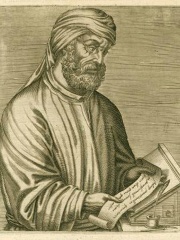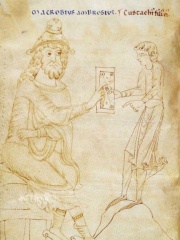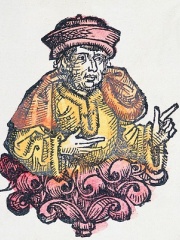



The Most Famous
PHILOSOPHERS from Tunisia
This page contains a list of the greatest Tunisian Philosophers. The pantheon dataset contains 1,267 Philosophers, 5 of which were born in Tunisia. This makes Tunisia the birth place of the 33rd most number of Philosophers behind Australia, and Brazil.
Top 5
The following people are considered by Pantheon to be the most legendary Tunisian Philosophers of all time. This list of famous Tunisian Philosophers is sorted by HPI (Historical Popularity Index), a metric that aggregates information on a biography's online popularity.

1. Tertullian (155 - 220)
With an HPI of 78.04, Tertullian is the most famous Tunisian Philosopher. His biography has been translated into 69 different languages on wikipedia.
Tertullian (; Latin: Quintus Septimius Florens Tertullianus; c. 155 – c. 220 AD) was a prolific early Christian author from Carthage in the Roman province of Africa. He was the first Christian author to produce an extensive corpus of Latin Christian literature and was an early Christian apologist and a polemicist against heresy, including contemporary Christian Gnosticism. Tertullian was the first theologian to write in Latin, and so has been called "the father of Latin Christianity", as well as "the founder of Western theology". He is perhaps most famous for being the first writer in Latin known to use the term trinity (Latin: trinitas). Tertullian originated new theological concepts and advanced the development of early Church doctrine. However, some of his teachings, such as the subordination of the Son and Spirit to the Father, were later rejected by the Catholic Church. According to Jerome, he later joined the Montanist sect and may have apostasized; however, modern scholars dispute this.

2. Macrobius (370 - 430)
With an HPI of 68.81, Macrobius is the 2nd most famous Tunisian Philosopher. His biography has been translated into 35 different languages.
Macrobius Ambrosius Theodosius, usually referred to as Macrobius (fl. c. AD 400), was a Roman provincial who lived during the early fifth century, during late antiquity, the period of time corresponding to the Later Roman Empire, and when Latin was as widespread as Greek among the elite. He is primarily known for his writings, which include the widely copied and read Commentarii in Somnium Scipionis ("Commentary on the Dream of Scipio") about Somnium Scipionis, which was one of the most important sources for Neoplatonism in the Latin West during the Middle Ages; the Saturnalia, a compendium of ancient Roman religious and antiquarian lore; and De differentiis et societatibus graeci latinique verbi ("On the Differences and Similarities of the Greek and Latin Verb"), which is now lost. He is the basis for the protagonist Manlius in Iain Pears' book The Dream of Scipio.

3. Arnobius (255 - 327)
With an HPI of 67.11, Arnobius is the 3rd most famous Tunisian Philosopher. His biography has been translated into 32 different languages.
Arnobius (died c. 330) was an early Christian apologist of Berber origin during the reign of Diocletian (284–305). According to Jerome's Chronicle, Arnobius, before his conversion, was a distinguished Numidian rhetorician at Sicca Veneria (El Kef, Tunisia), a major Christian center in Proconsular Africa, and owed his conversion to a premonitory dream. However, Arnobius writes dismissively of dreams in his surviving book. According to Jerome, to overcome the doubts of the local bishop as to the earnestness of his Christian belief he wrote (c. 303, from evidence in IV:36) an apologetic work in seven books, which St. Jerome calls Adversus gentes but which is entitled Adversus nationes in the only (9th-century) manuscript that has survived. Jerome's reference, his remark that Lactantius was a pupil of Arnobius and the surviving treatise are the only known facts about Arnobius that have been transmitted.

4. Clitomachus (187 BC - 110 BC)
With an HPI of 65.41, Clitomachus is the 4th most famous Tunisian Philosopher. His biography has been translated into 26 different languages.
Clitomachus or Cleitomachus (Ancient Greek: Κλειτόμαχος, Kleitómakhos; 187/6–110/9 BC) was a Greek philosopher, originally from Carthage, who came to Athens in 163/2 BC and studied philosophy under Carneades. He became head of the Academy around 127/6 BC. He was an Academic skeptic like his master. Nothing survives of his writings, which were dedicated to making known the views of Carneades, but Cicero made use of them for some of his works.

5. Pierre Lévy (b. 1956)
With an HPI of 56.14, Pierre Lévy is the 5th most famous Tunisian Philosopher. His biography has been translated into 16 different languages.
Pierre Lévy (French: [levi]; born 1956) is a Tunisian-born French philosopher, cultural theorist and media scholar who specializes in the understanding of the cultural and cognitive implications of digital technologies and the phenomenon of human collective intelligence. He introduced the collective intelligence concept in his 1994 book L'intelligence collective: Pour une anthropologie du cyberspace (Collective Intelligence: Mankind's Emerging World in Cyberspace). Lévy's 1995 book, Qu'est-ce que le virtuel? (translated as Becoming Virtual: Reality in the Digital Age) develops philosopher Gilles Deleuze's conception of "the virtual" as a dimension of reality that subsists with the actual but is irreducible to it. In 2001, he wrote the book Cyberculture. He was a professor at the communication department of the University of Ottawa, where he held a Canada Research Chair in Collective Intelligence. Lévy is fellow of the Royal Society of Canada and received several awards and academic distinctions. Pierre Lévy is currently retired and works on developing the Information Economy MetaLanguage (IEML).
People
Pantheon has 5 people classified as Tunisian philosophers born between 187 BC and 1956. Of these 5, 1 (20.00%) of them are still alive today. The most famous living Tunisian philosophers include Pierre Lévy. The most famous deceased Tunisian philosophers include Tertullian, Macrobius, and Arnobius.
Living Tunisian Philosophers
Go to all RankingsDeceased Tunisian Philosophers
Go to all RankingsTertullian
155 - 220
HPI: 78.04
Macrobius
370 - 430
HPI: 68.81
Arnobius
255 - 327
HPI: 67.11
Clitomachus
187 BC - 110 BC
HPI: 65.41

